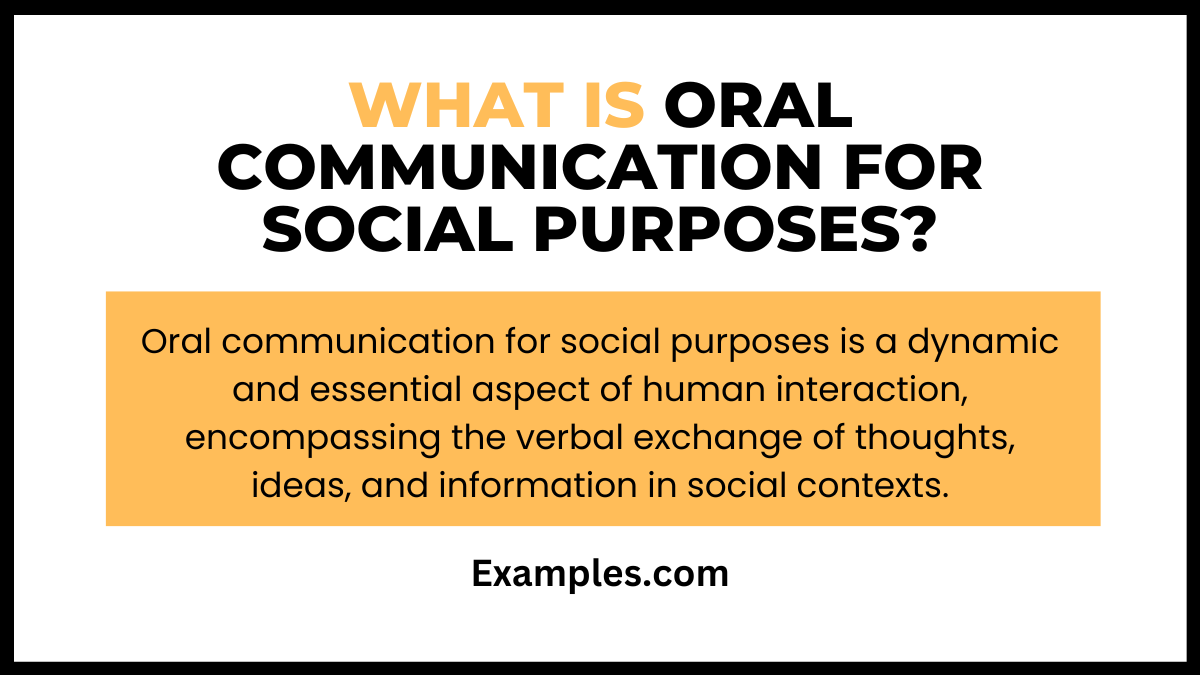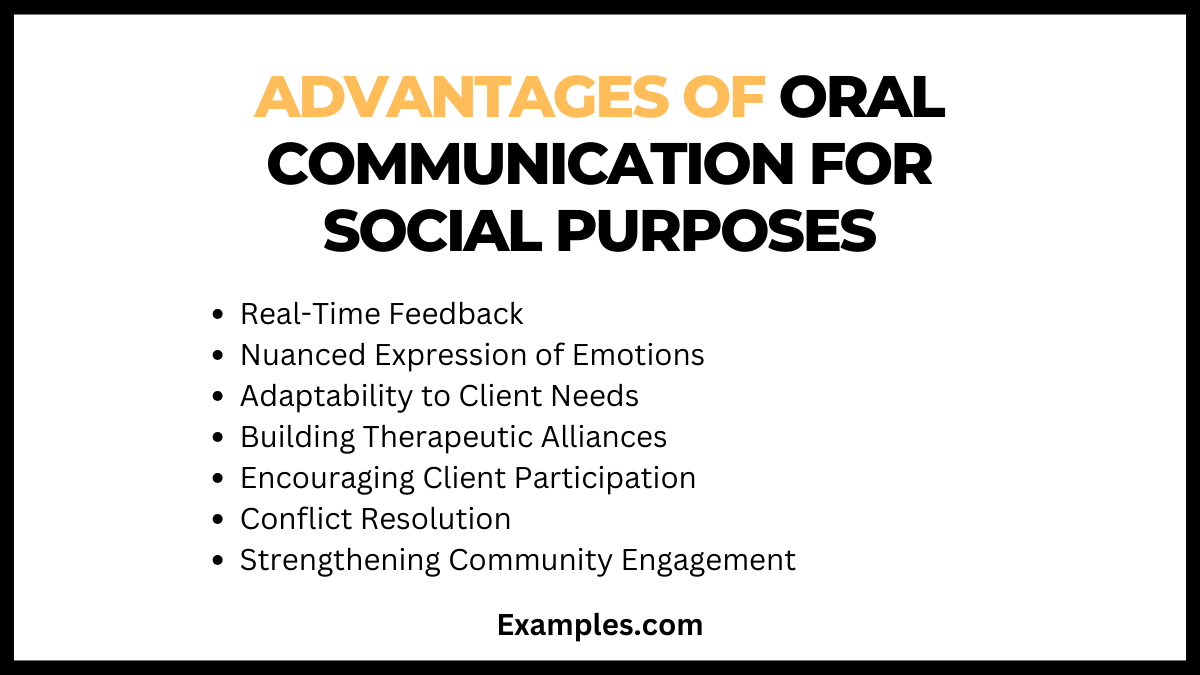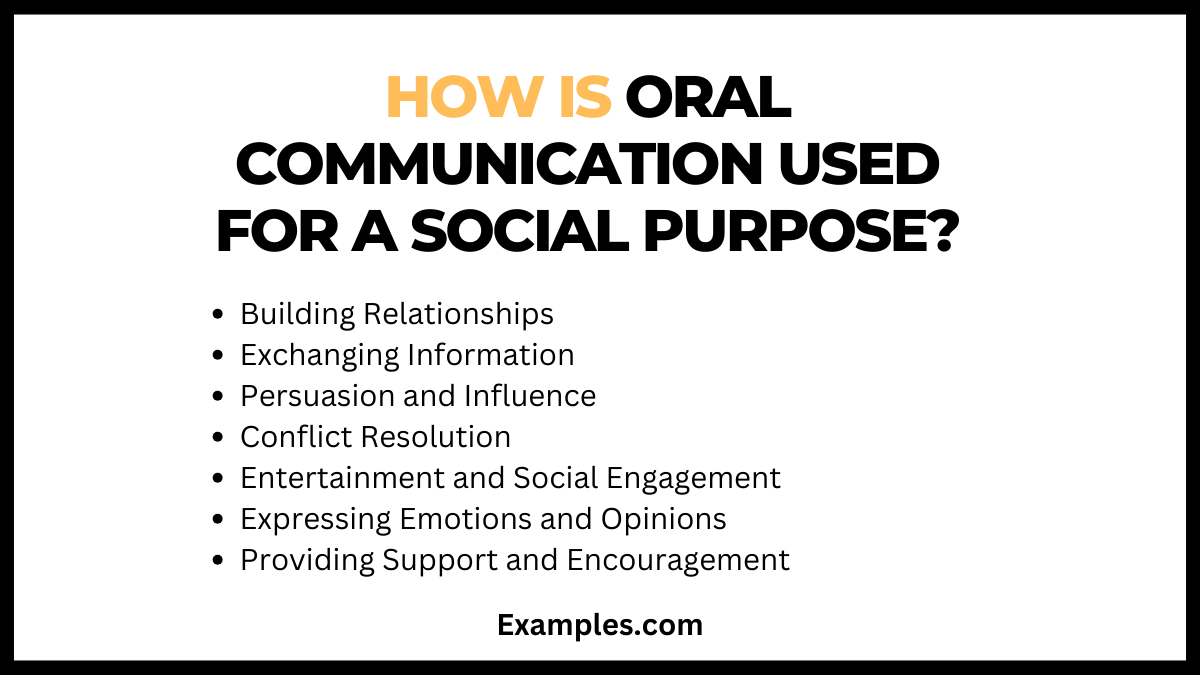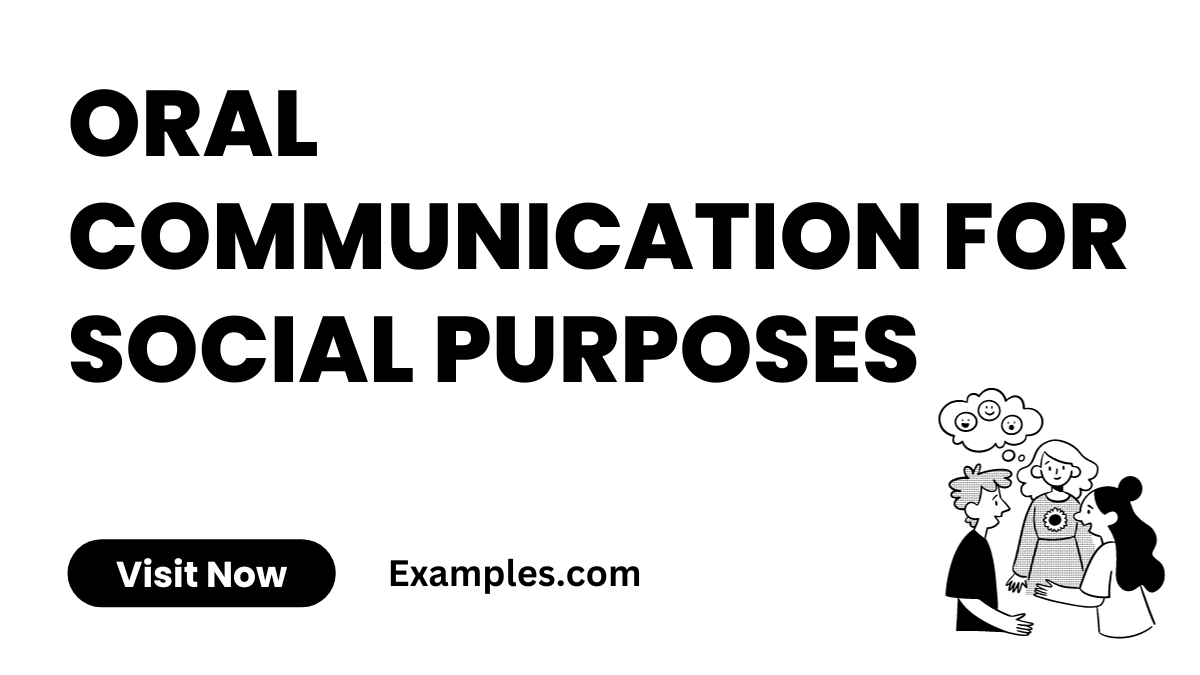Oral Communication for Social Purposes Examples
Embark on a journey of enhanced social connections with our comprehensive guide on oral communication for social purposes. Whether navigating social events or engaging in everyday conversations, mastering effective oral communication is paramount. Discover valuable insights, practical tips, and enriching communication examples to elevate your ability to connect and express yourself with confidence. Strengthen your social prowess and leave a lasting impression in diverse social scenarios. Let’s delve into the art of verbal expression for more meaningful interactions.
What is Oral Communication for Social Purposes?

Oral communication for social purposes is a dynamic and essential aspect of human interaction, encompassing the verbal exchange of thoughts, ideas, and information in social contexts. It involves using spoken words, tone, and non-verbal cues to convey messages effectively. In social settings, mastering oral communication enables individuals to express themselves, build connections, and navigate various interpersonal scenarios with confidence and understanding.
In social situations, effective oral communication involves a delicate balance of verbal and non-verbal elements. Utilizing body language, facial expressions, and appropriate tone enhances the impact of spoken words. Clear articulation, active listening, and adaptability to diverse social contexts are crucial elements that contribute to successful communication in social settings.
Key Components of Effective Oral Communication
- Clarity and Articulation: Clearly expressing thoughts ensures that the intended message is easily understood.
- Active Listening: Attentive listening fosters better understanding and enables thoughtful responses in social interactions.
- Non-Verbal Cues: Incorporating appropriate body language and facial expressions enhances the emotional resonance of communication.
- Adaptability: Being flexible in communication style allows individuals to connect effectively with diverse personalities.
Challenges and Solutions in Oral Communication for Social Purposes
Navigating challenges in social oral communication involves addressing common issues such as misinterpretation, misunderstandings, and discomfort. Overcoming communication barriers requires practicing active listening, seeking clarification when needed, and being mindful of non-verbal cues to ensure a harmonious exchange of ideas.
Improving Oral Communication Skills for Social Success
Enhancing oral communication skills for social purposes involves continuous improvement and self-reflection. Engaging in activities that encourage social interactions, seeking constructive feedback, and participating in public speaking opportunities contribute to honing effective oral communication skills. Practice, exposure, and a willingness to learn are key factors in becoming a confident and adept communicator in social contexts.
Why is Oral Communication Important in Social Work?
In the realm of social work, effective oral communication for social purposes holds immense significance. This guide explores the pivotal role of oral communication and its impact on fostering connections within social work contexts.
1. Facilitating Client Understanding
Oral communication plays a crucial role in ensuring clients comprehend the information provided. Clear and empathetic communication enhances client understanding, promoting trust and collaboration.
2. Building Rapport and Trust
Establishing a strong rapport with clients is foundational in social work. Through oral communication, social workers can convey empathy, active listening, and support, fostering a trusting relationship.
3. Coordination and Collaboration
Effective teamwork is integral to social work success. Oral communication facilitates seamless coordination and collaboration among multidisciplinary teams, ensuring a holistic approach to client care.
4. Advocacy and Empowerment
Advocacy is a core aspect of social work. Through articulate oral communication, social workers can empower clients by effectively representing their needs, concerns, and rights.
5. Crisis Intervention
During crisis situations, timely and clear communication is vital. Oral communication enables social workers to provide immediate support, guidance, and interventions, contributing to crisis resolution.
6. Enhancing Cultural Competence
Cultural sensitivity is paramount in social work. Effective oral communication allows social workers to navigate diverse cultural contexts, ensuring respectful and inclusive interactions.
7. Documentation and Record-Keeping
Accurate documentation is essential in social work practice. Oral communication skills aid in articulating information clearly, facilitating the creation of comprehensive and precise records.
Advantages of Oral Communication for Social Purposes

Delve into the advantages of leveraging oral communication for social purposes. Uncover the various benefits that contribute to the effectiveness of social work practices.
1. Real-Time Feedback
Oral communication allows for immediate feedback, enabling social workers to gauge client understanding, emotions, and concerns in real-time.
2. Nuanced Expression of Emotions
Verbal communication provides a platform for clients to express nuanced emotions and experiences, fostering a deeper understanding for social workers.
3. Adaptability to Client Needs
Oral communication offers flexibility, allowing social workers to tailor their communication style to the specific needs and preferences of each client.
4. Building Therapeutic Alliances
Establishing therapeutic alliances is facilitated through oral communication, creating a supportive and conducive environment for clients to share their experiences.
5. Encouraging Client Participation
Clear and engaging oral communication encourages active client participation in the decision-making process, promoting a sense of agency and empowerment.
6. Conflict Resolution
In social work, conflicts may arise. Effective oral communication skills aid in resolving conflicts and negotiating solutions for the benefit of clients and the community.
7. Strengthening Community Engagement
Oral communication extends beyond individual interactions, contributing to community engagement. Social workers can use verbal skills to mobilize and empower communities for positive change.
Explore the advantages and importance of oral communication for social purposes, recognizing its transformative impact on social work practices. This guide serves as a valuable resource for social workers seeking to enhance their communication skills for the betterment of their clients and communities.
How is Oral Communication Used for a Social Purpose?

Oral communication plays a vital role in social interactions, serving various purposes that facilitate understanding, connection, and community building.
Building Relationships
- Initiating Conversations: Oral communication is often the starting point of social relationships, whether in personal or professional settings.
- Developing Rapport: Effective conversational skills help in creating rapport and establishing trust between individuals.
Exchanging Information
- Sharing Knowledge and Ideas: People use oral communication to share information, impart knowledge, and exchange ideas in social settings.
- Informal Discussions: Casual talks and discussions are common in social gatherings, contributing to knowledge sharing and community awareness.
Persuasion and Influence
- Changing Opinions: Through persuasive dialogue, individuals can influence others’ opinions and perspectives in social contexts.
- Advocating for Causes: Oral communication is a powerful tool in advocating for social, political, or environmental causes.
Conflict Resolution
- Mediating Disputes: Effective oral communication is essential in resolving misunderstandings and conflicts in social interactions.
- Negotiating Outcomes: Negotiation skills, a part of oral communication, play a crucial role in finding mutually agreeable solutions.
Entertainment and Social Engagement
- Storytelling and Anecdotes: Sharing stories and anecdotes is a common social use of oral communication, providing entertainment and cultural exchange.
- Social Networking: Engaging in conversations at social events helps in networking and building social connections.
Expressing Emotions and Opinions
- Conveying Feelings: Verbal communication is used to express emotions like joy, frustration, or sympathy in social interactions.
- Voicing Opinions: In group discussions or debates, oral communication allows individuals to express their opinions and viewpoints.
Providing Support and Encouragement
- Emotional Support: Conversations can offer comfort and emotional support to friends or family members in need.
- Motivational Speeches: Inspirational talks and speeches can motivate and uplift audiences in social gatherings.
Oral communication for social purposes encompasses a wide range of interactions, each serving to enhance human connection, community cohesion, and social understanding. These skills are integral to forming strong social bonds and maintaining healthy, dynamic communities.
How to Improve Oral Communication for Social Purposes?
Enhancing oral communication skills for social interactions involves both practice and understanding of key principles.
Practice Active Listening
- Attentive Engagement: Focus on the speaker, showing genuine interest in their words.
- Feedback and Clarification: Offer feedback and ask for clarification to ensure understanding.
Expand Vocabulary
- Language Enrichment: Regularly learn new words and phrases to articulate thoughts more effectively.
- Contextual Usage: Practice using new vocabulary in appropriate social settings.
Develop Clarity and Conciseness
- Clear Articulation: Speak clearly, ensuring your words are easily understood.
- Brevity: Convey your messages concisely without unnecessary elaboration.
Improve Nonverbal Skills
- Body Language: Use positive body language to reinforce your spoken words.
- Eye Contact: Maintain eye contact to establish a connection with your audience.
Tips for Professional Oral Communication for Social Purposes
Mastering oral communication for social purposes in a professional setting requires specific strategies:
Understand Your Audience
- Audience Awareness: Tailor your speech based on the audience’s interests and level of understanding.
- Cultural Sensitivity: Be aware of cultural nuances and differences in communication styles.
Structured Communication
- Organized Thoughts: Plan your speech or conversation with a clear beginning, middle, and end.
- Purposeful Speaking: Ensure each conversation has a clear purpose or goal.
Confidence Building
- Self-Assurance: Speak with confidence to engage and persuade your audience effectively.
- Practice: Regular practice in varied social situations helps build confidence.
Feedback and Adaptation
- Seek Constructive Feedback: Actively seek feedback on your communication style and adapt accordingly.
- Continuous Improvement: View each social interaction as an opportunity to improve your skills.
By implementing these tips, individuals can significantly improve their oral communication skills, leading to more effective and rewarding social interactions in professional environments.
In conclusion, effective oral communication for social purposes is a vital skill that enhances interpersonal interactions and strengthens social connections. By mastering the art of clear articulation, active listening, and adaptability, individuals can navigate diverse social settings with confidence and ease. For further insights on enhancing these skills, the American Psychological Association offers valuable resources on communication psychology. Additionally, educational platforms like Coursera provide courses and materials to help refine communication techniques, ensuring individuals are well-equipped for successful social engagements.



